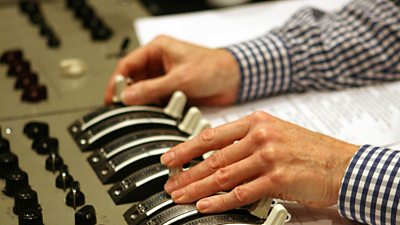����ý TV re-started its post war service in the summer of 1946, a year before the Cold War really started to emerge from the debris of six years of ‘hot’ war. By 1947, ����ý TV and radio had stepped up its fight against fake news coming from the communist world - but it was no easy task.
Obtaining film and TV footage from the socialist countries and other communist states during the Cold War was difficult, and official films and recordings were generally censored.
Available footage consisted largely of hours of dreary Communist Party conferences, and films about state planning, pumped out to the west via the network, the communist countries’ equivalent of
Objective reporting from the communist world became almost impossible, but the ����ý had contacts and specialists who they could call on, many of whom worked clandestinely.
Filming and newsgathering behind the Iron Curtain went on despite the difficulties, and our video shows some of the key moments collected by ����ý TV during the Cold War, accompanied by music that inspired a generation.
The Music
1968, scenes from Czechoslovakia: Modlitba pro Martu (A prayer for Marta), sung by Marta Kubišová. The song became a symbol of national resistance against the invasion of Czechoslovakia by Warsaw Pact troops. Following the imposition of hard line communist rule, Kubišová was banned from performing until 1989.
1975, scenes from the fall of Saigon: Stanley Myers, a name synonymous with music for film and television originally composed Cavatina for the 1970 film The Walking Stick. However, his evocative theme, played by John Williams, became forever associated with Vietnam, following its use as the title music for The Deer Hunter, a film that tracked the fate of three American steelworkers embroiled in the protracted war in that country.
1985, Moscow Olympics & the Reagan - Gorbachev summit: State Anthem of the Soviet Union, sung by The Red Army Choir, was the national anthem of the USSR between 1944-1991. Composed by Alexander Alexandrov, with original lyrics by Sergey Mikhalkov, it was revived in 2000 with different lyrics, and is now the national anthem of the Russian Federation.
1989, scenes from Tiananmen Square: Bloodstained Glory, sung by Anita Mui, was originally a patriotic song to memorialise those killed in the 1979 Sino-Vietnamese war. However the song was taken up by Mui to mark the suppression of the Tiananmen Square protests, and is often performed in Hong Kong at the anniversary of the Tiananmen Square clampdown.
1989, scenes from the Berlin Wall and Bucharest: German band The Scorpions sung the worldwide hit Winds of Change following the failed Soviet coup of 1991. It symbolised the end of an era, which saw the last European communist regimes fall, finally, by March 1991.
Written by John Escolme, ����ý History Manager.

